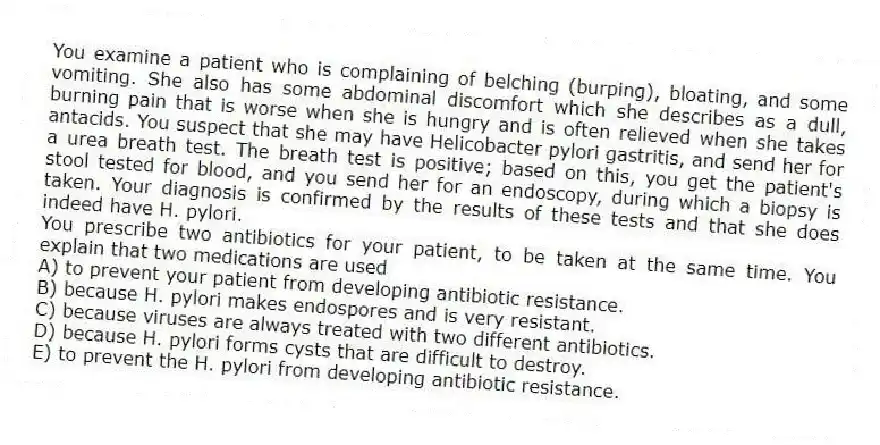
You examine a patient who is complaining of belching (burping) , bloating, and some vomiting. She also has some abdominal discomfort which she describes as a dull, burning pain that is worse when she is hungry and is often relieved when she takes antacids. You suspect that she may have Helicobacter pylori gastritis, and send her for a urea breath test. The breath test is positive; based on this, you get the patient's stool tested for blood, and you send her for an endoscopy, during which a biopsy is taken. Your diagnosis is confirmed by the results of these tests and that she does indeed have H. pylori.
-You prescribe two antibiotics for your patient, to be taken at the same time. You explain that two medications are used
A) to prevent your patient from developing antibiotic resistance.
B) because H. pylori makes endospores and is very resistant.
C) because viruses are always treated with two different antibiotics.
D) because H. pylori forms cysts that are difficult to destroy.
E) to prevent the H. pylori from developing antibiotic resistance.
Correct Answer:
Verified
Q75: The most medically relevant species of Pseudomonas
Q76: The genomes of free-living spirochetes are larger
Q77: What distinguishes Staphylococcus, species from Streptococcus, Enterococcus
Q78: A student complains that it makes no
Q79: Which of the following are spirochetes?
A) Borrelia
Q80: Rhizobium is considered an endosymbiont with plants.
Q81: You examine a patient who is complaining
Q82: You examine a patient who is complaining
Q83: You examine a patient who is complaining
Q85: You examine a patient who is complaining
Unlock this Answer For Free Now!
View this answer and more for free by performing one of the following actions

Scan the QR code to install the App and get 2 free unlocks

Unlock quizzes for free by uploading documents